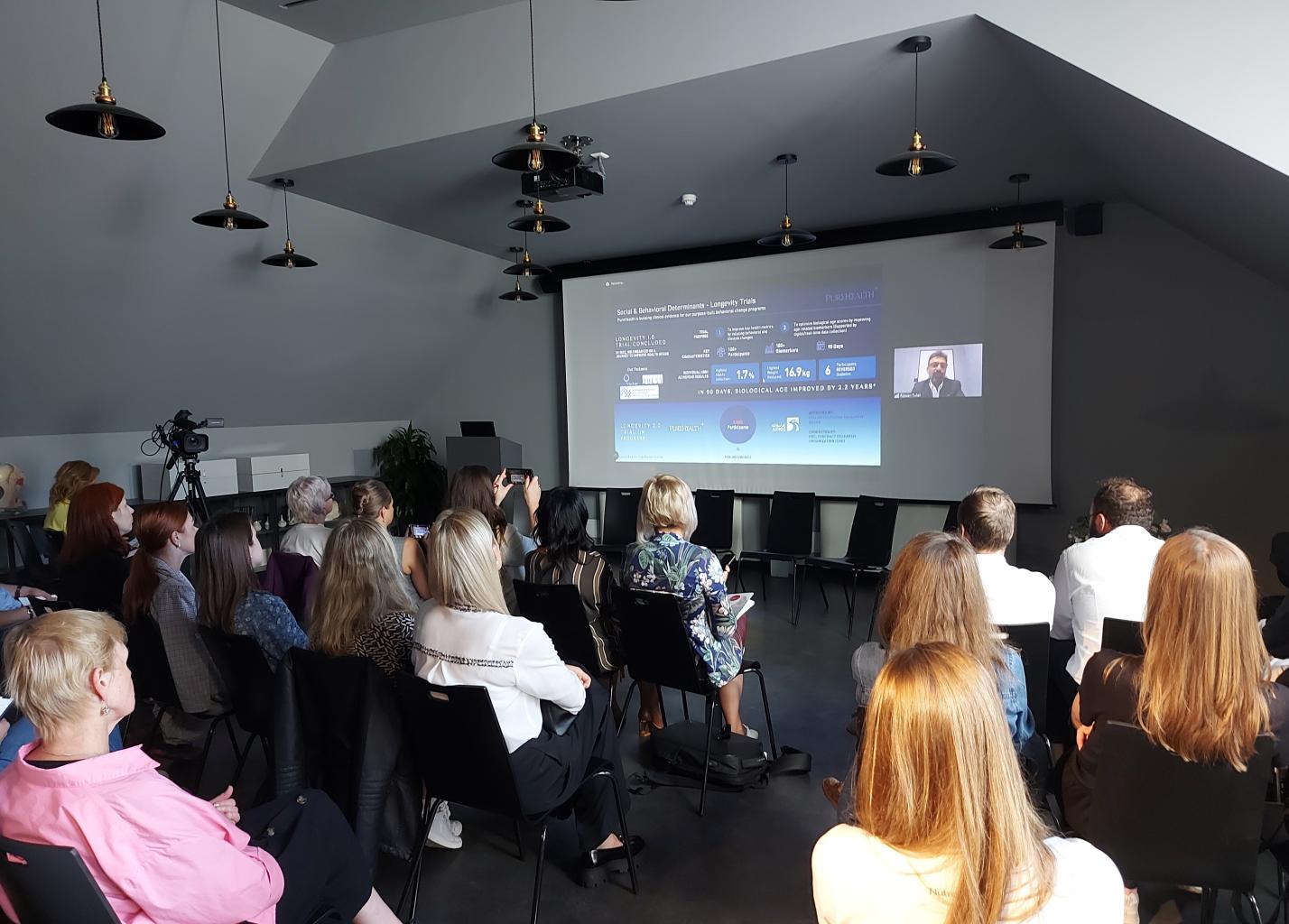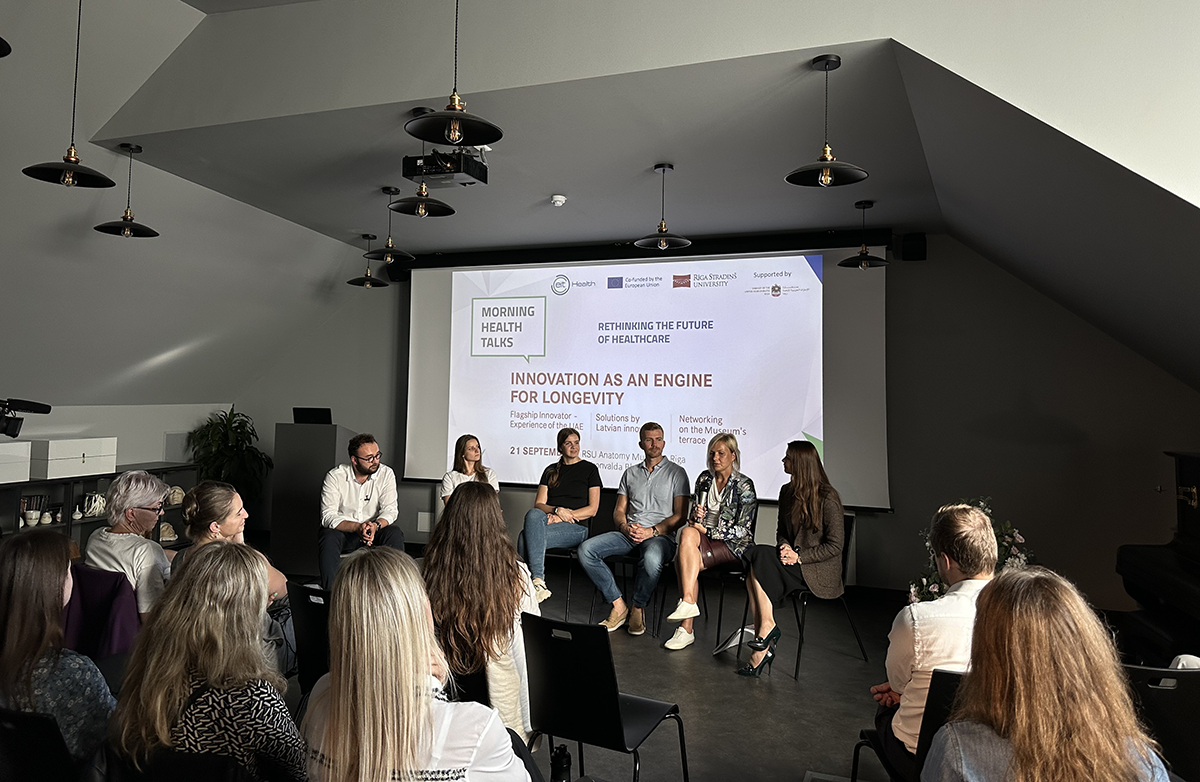EIT Morning Health Talks focus on innovation as an engine for longevity
The second event of this year's EIT Health Morning Health Talks series took place on 21 September in collaboration with the Embassy of the United Arab Emirates (UAE) in Latvia. The theme of the event was innovation as an engine for longevity.
Healthcare system overload, mortality from preventable diseases, and other challenges show that the current healthcare model is not sustainable. When thinking about solutions, experts agree that the medicine of the future is personalised and preventive. In a discussion organised by the EIT Health RIS Hub in Latvia (European Institute of Innovation & Technology Health Knowledge and Innovation Community Regional Innovation Scheme) experts emphasised that bringing these changes to life requires the involvement of health professionals and society itself.
‘These shifts in mindset and behaviour are especially important to Latvia as our country's health indicators are often alarming compared to other European countries,’ said Baiba Pētersone, Director of the Rīga Stradiņš University (RSU) International Department and Head of the EIT Health RIS Hub in Latvia. ‘One of our main tasks is to identify and implement new models that help society shift from treatment to prevention, and ultimately achieve longevity. This does not mean just adding more years to a person's life, but additional years in which people actively enjoy life and are in good health.’

Presentation by Rizwan Tufail, Executive Director, Pure Health Data Management Office
The goal is to reach people before medical solutions are needed
At this event, local Latvian health industry innovators had the opportunity to learn about Pure Health’s, the largest integrated healthcare network in UAE, approach to developing longevity science and transforming the healthcare system through innovation. The UAE-based company has set itself an ambitious goal – to increase the population's life expectancy to 101 years by 2071, and to ensure that 94 of these years are spent in good health, said Rizwan Tufail, Executive Director of Pure Health Data Management Office.
Referring to the saying “it takes a village to raise a child”, Tufail pointed out that changes can only be possible by thinking about the healthcare ecosystem holistically. It is necessary to work at the level of health sector policy, preventive and conventional medicine, and pay attention to factors such as societal behaviour and the environment, which significantly affect quality of health. To prolong healthy years, we need to think about how we can change the people’s habits before they need hospital care. This can be done by providing guidance on aspects of health preservation and improvement.
The UAE is willing to become a testing ground for various innovations in the health sector that have the potential to improve life expectancy. H.E. Hanan Khalfan Obaid AL Madhani Al Aleeli, the UAE Ambassador to Latvia, emphasised in her speech that the UAE is interested in cooperation opportunities with Latvian health innovators.
Involvement and trust between healthcare workers and patients is essential
Various innovations are being developed in Latvia that could help in the field of preventive health and contribute to relieving the burden on the healthcare system, reducing chronic morbidity, and helping patients and doctors to learn about potential health risks early. The Latvian health innovators invited to the discussion highlighted that new solutions are slow to reach medical practitioners and consumers and that it is necessary to think about promoting health literacy.
The current pressure on the healthcare system is enormous and this cannot be remedied without involving technology, said Normunds Daudišs, founder of UPOlife, whose company works on early diagnostic solutions. The businessman believes that due to healthcare specialists’ workload, we should be looking for self-diagnosis solutions that can be used by patients themselves. He noted that medical practitioners are open to cooperation, but too busy, and that the introduction of innovations should take place with the involvement of the state.
Elīna Balode, co-founder of Nutrameg, whose company offers technology for weight control and fitness, agreed that digital tools and applications have great potential in general practitioners’ practices. She pointed out that slogans about changing habits that will lead to a longer and better life only affect users later, but people want to see quick results such as weight loss.
During the discussion, there was a lot of talk about the importance of a personalised approach in preventive health, as it ensures greater patient involvement. Emil Syundyukov, co-founder and CEO of Longenesis, highlighted this as an important aspect of the development of medical innovations. It is also essential to work on public education. Anda Penka, co-founder of the probiotic drink company Fermentful, pointed out that people are already interested in improving their health and well-being. ‘We want to be healthier,’ she emphasised.

Moderated discussion by Emīls Sjundjukovs (Longenesis) with Elīna Balode (Nutrameg), Natālija Jermolajeva (Correcty), Normunds Daudišs (UPOlife), Linda Lancere (ARehab, Virtual-Gym), Anda Penka (Fermentful)
EIT Health Morning Health Talks are dedicated to convening regional leaders to help map best practices and common challenges of digital health solutions. The primary audience of talks held in Latvia is senior managers of hospitals and medical staff.
Since 2020, EIT Health Morning Health Talks are organised by the European Institute of Innovation and Technology Health Knowledge and Innovation Community (EIT Health) representation hub in Latvia (EIT RIS Hub), which is coordinated by the RSU International Department.
Related news
 RSU students win silver in European i-Days finals with idea for medical deviceFor Students, Innovation, Recognition, EIT Health
RSU students win silver in European i-Days finals with idea for medical deviceFor Students, Innovation, Recognition, EIT Health


